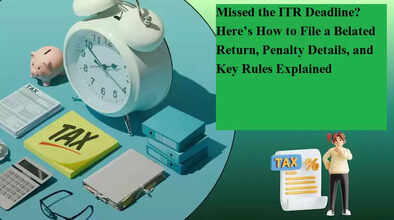Missed the ITR Deadline? Here’s How to File a Belated Return, Penalty Details, and Key Rules Explained

If you missed the deadline to file your Income Tax Return (ITR), you still have a chance to comply with tax laws by filing a belated return. The original deadline to file ITR for the current assessment year was 31 July 2025, which was first extended to 15 September and given a final grace period until 16 September 2025. Taxpayers who could not meet these dates can now submit their belated return by 31 December 2025, but with certain penalties and limitations.
What Is a Belated Return?
A belated return is an ITR filed after the due date mentioned under Section 139(1) of the Income Tax Act. Typically, this deadline is 31 July each year, but for this assessment year it was extended due to changes in ITR forms. Any return filed after 16 September 2025 but before 31 December 2025 will be treated as a belated return.
Penalties and Late Fees
Filing a belated return attracts penalties under Section 234F of the Income Tax Act:
-
Taxpayers with annual income above ₹5 lakh will have to pay a late fee of ₹5,000.
-
Those with annual income below ₹5 lakh will pay a late fee of ₹1,000.
-
Additionally, any unpaid tax will attract 1% interest per month until payment is made.
Tax authorities also warn that mismatches between declared income and data shown in Form 26AS or the Annual Information Statement (AIS), such as discrepancies in Tax Deducted at Source (TDS), can trigger notices. Salaried individuals and freelancers should double-check these details to avoid complications.
Key Restrictions on Belated Returns
While you can still claim a tax refund by filing a belated return, there are several limitations:
-
No change in tax regime: You cannot switch between the old and new tax regimes after the original deadline.
-
Limited deductions: Certain deductions and exemptions under Sections 10A, 10B, 80-IA, 80-IB, 80-IC, 80-ID, and 80-IE cannot be claimed.
-
Loss carry-forward restrictions: Losses from business or capital gains cannot be carried forward to future years, though losses on house property can still be carried forward.
Failure to pay outstanding tax can lead to severe penalties, including prosecution. Non-payment may result in imprisonment of 3 months to 2 years, and if unpaid tax exceeds ₹25 lakh, the sentence can extend to 6 months to 7 years. While such cases are rare for salaried taxpayers, they highlight the importance of timely compliance.
Step-by-Step Guide to File a Belated Return
You can file a belated ITR through the Income Tax e-filing portal by following these steps:
-
Log in to the Income Tax e-filing portal.
-
Go to e-File and select Income Tax Returns.
-
Click on File Income Tax Return.
-
Choose the filing mode and click Start New Filing.
-
Select your status (Individual/HUF/Others).
-
Pick the applicable ITR form.
-
Verify your personal details.
-
In the “Filing Section,” choose 139(4) – Belated Return.
-
Enter income details, deductions, and other required information.
-
Submit the return and complete e-verification.
Refunds and Revised Returns
Yes, a refund can still be claimed on a belated return, provided the bank account is pre-validated and the return is e-verified. A belated return can also be revised if any errors are discovered. However, the deadline to revise is the same as the belated filing deadline—31 December 2025 or three months before the end of the assessment year, whichever is earlier.
Final Takeaway
Filing a belated return gives taxpayers a valuable opportunity to avoid stricter penalties and legal action. However, the process comes with additional costs, limited deductions, and restrictions on carrying forward losses. If you missed the original deadline, act quickly to file your return by 31 December 2025 to minimize penalties and protect your financial record.

